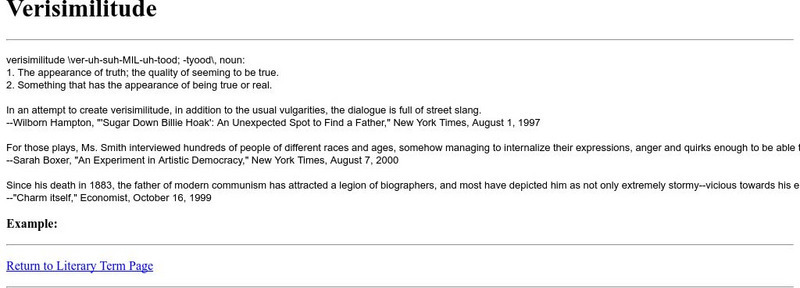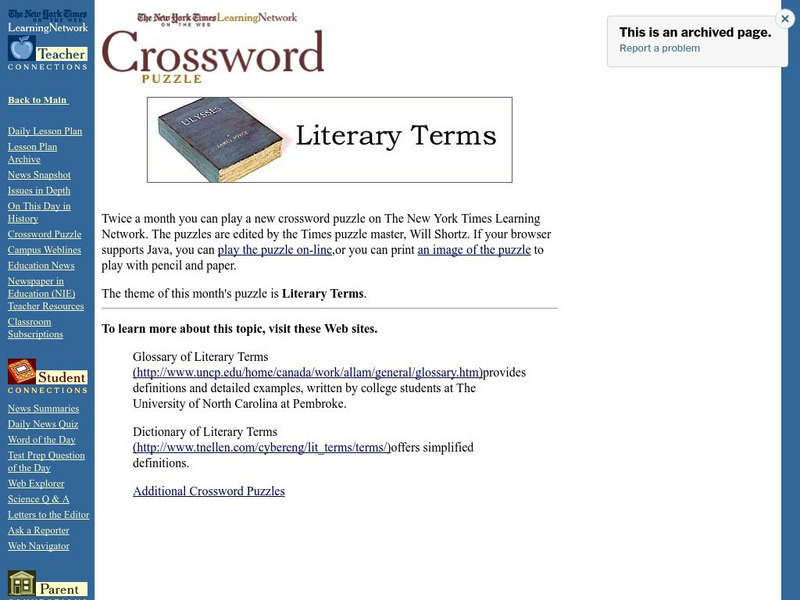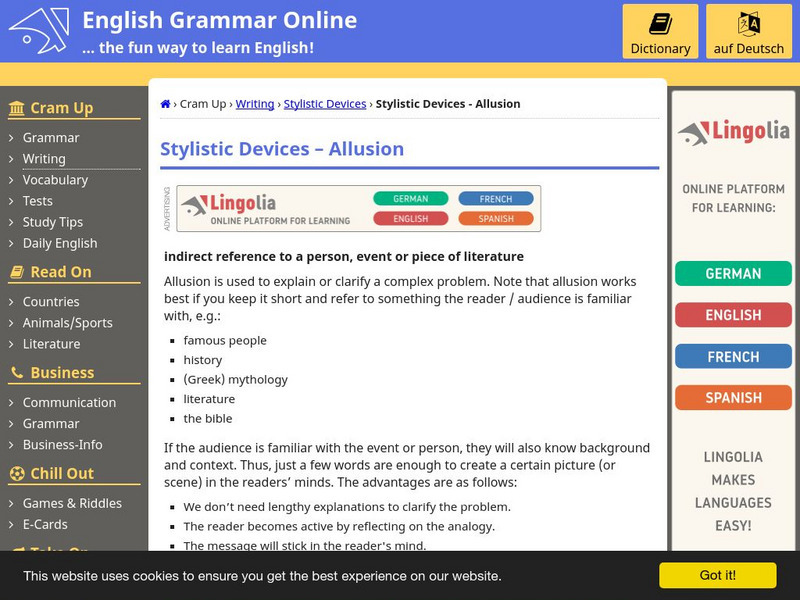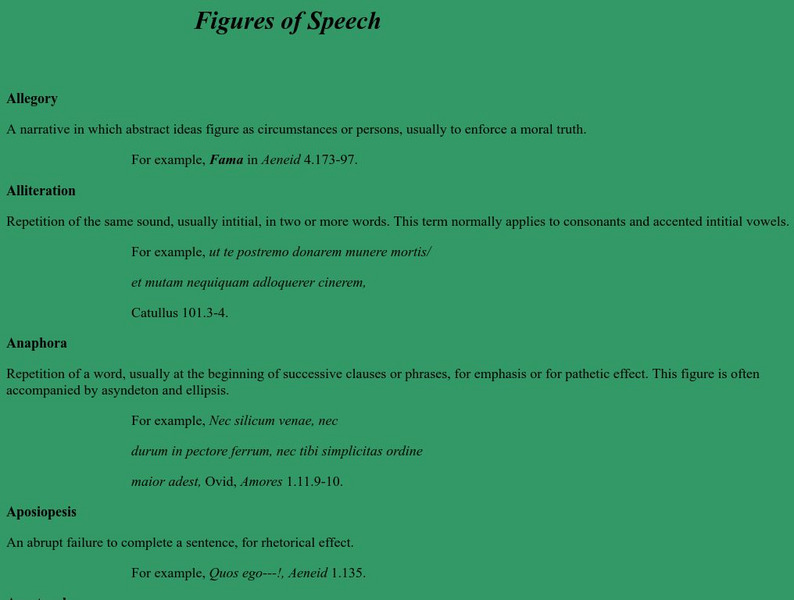Ted Nellen
Cyber English (By Ted Nellen): Literary Terms S Z
The third of three pages of simple definitions for literary terms. This page, S - Z, covers twenty-two terms from "Saga," to "Understatement."
Ted Nellen
Cyber English (By Ted Nellen): Anaphora
This is a glossary entry for the term "Anaphora" including the definition, examples, and a link to more information.
Ted Nellen
Cyber English (By Ted Nellen): Anastrophe
This is a glossary entry for the term "Anastrophe" including the definition and an example.
Ted Nellen
Cyber English (By Ted Nellen): Aphorism
This is a glossary entry of the term "Aphorism" including definitions and examples.
Ted Nellen
Cyber English (By Ted Nellen): Assonance
This is a glossary entry for the term "Assonance" including a definition and an example.
Ted Nellen
Cyber English (By Ted Nellen): Circumlocution
This is a glossary entry for the term Circumlocution meaning "a roundabout or indirect manner of writing or speaking."
Ted Nellen
Cyber English (By Ted Nellen): Hyperbaton
This is a glossary entry for the figure of speech "Hyperbaton" including definitions from two sources.
Ted Nellen
Cyber English (By Ted Nellen): Juxtaposition
This is a glossary entry for the term "Juxtaposition" including multiple definitions.
Ted Nellen
Cyber English (By Ted Nellen): Metonymy
This is a glossary entry for the term "Metonymy" including a definition, an example, and a link to Wikipedia.
Ted Nellen
Cyber English (By Ted Nellen): Negative Capability
This is a glossary entry for the term "Negative Capability" including the definition and a link to an example.
Ted Nellen
Cyber English (By Ted Nellen): Polysyndeton
This is a glossary entry for the term "Polysyndeton" including a definition and literary examples.
Ted Nellen
Cyber English (By Ted Nellen): Synecdoche
This is a glossary entry for the term "Synecdoche" including a definition and an example.
Ted Nellen
Cyber English (By Ted Nellen): Verisimilitude
This is a glossary entry for the term "Verisimilitude" including the definition and examples.
Emory University
Emory University Writing Center: Personification
A definition of personification. Includes two examples- one from the poetry of Sylvia Plath, the other from John Keats' poem "To Autumn."
University of Victoria (Canada)
The U Vic Writer's Guide: Literary Term: Oxymoron
This site from The UVic Writer's Guide provides a brief description of the literary term "oxymoron." Content includes a literary example.
Houghton Mifflin Harcourt
Holt, Rinehart and Winston: Elements of Literature: Ambiguity Chart [Pdf]
A graphic organizer for learning and applying understanding of the literary element of ambiguity. Includes sections in which you list the ambiguity from a given text and its possible interpretations.
New York Times
New York Times: Crossword Puzzle: Literary Terms
An interactive and printable crossword puzzle developed by the New York Times Learning Network. The theme of this puzzle is Literary Terms. Other links are included.
Ted Nellen
Cyber English (By Ted Nellen): Euphemism
This is a glossary entry for the term "Euphemism" including a definition and examples. L.9-10.5a Figures of Speech
Other
English Grammar Online: Stylistic Devices: Allusion
If you need a brief, clear explanation of allusion and how it works, this is a good place to start.
ClassFlow
Class Flow: Oxymoron
[Free Registration/Login Required] In this interactive lesson, students will explore how oxymora are used in writing and look at examples. Complete description of this rhetorical effect.
Sophia Learning
Sophia: Hyperbole
This lesson introduces hyperbole as a rhetorical device. This tutorial lesson shares a short slideshow with the lesson's content.
Other
Hoocher: Figures of Speech
A list of figures of speech and their definitions with examples from literature.
Ted Nellen
Cyber English (By Ted Nellen): Hyperbole
This is a glossary entry for the figure of speech "Hyperbole" including a definition and examples.
University of Victoria (Canada)
The U Vic Writer's Guide: Literary Term: Soliloquy
This short definition of Soliloquy compares it with a similar literary convention, the "aside."

















![Holt, Rinehart and Winston: Elements of Literature: Ambiguity Chart [Pdf] Graphic Holt, Rinehart and Winston: Elements of Literature: Ambiguity Chart [Pdf] Graphic](http://content.lessonplanet.com/resources/thumbnails/410052/large/bwluav9tywdpy2symdiwmduymc03nza4ltfumdkxegsuanbn.jpg?1589985124)






